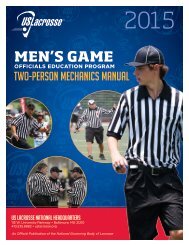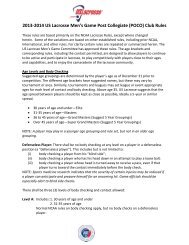BASKETBALL
Create successful ePaper yourself
Turn your PDF publications into a flip-book with our unique Google optimized e-Paper software.
Rule 5 / Scoring and Timing Regulations61<br />
Section 12. Timing Mistakes and Malfunctions<br />
The following articles pertain to mistakes and malfunctions in games played<br />
without a replay/television equipment. For timing mistakes and malfunctions in<br />
games with replay/television equipment, see Rule 11-1.<br />
Art. 1. When an obvious timing mistake has occurred because of the failure to<br />
start or stop the game clock properly, the mistake shall be corrected by the referee.<br />
After the mistake of either failing to start or stop the game clock, such a mistake<br />
shall be corrected:<br />
a. During the first dead ball and before the ball is touched inbounds or out of<br />
bounds by a player other than a thrower-in.<br />
b. When the clock should have been continuously running, the mistake shall<br />
be corrected before the second live ball is touched inbounds or out of<br />
bounds by a player other than a thrower-in.<br />
No timing mistake correction shall be carried over from one half or extra period to<br />
another. Such a mistake shall be corrected before the start of intermission.<br />
Art. 2. When the referee blows the whistle to signal for the game clock to be<br />
stopped and has definite knowledge that time has elapsed before the game clock<br />
stopped, the referee shall instruct the official timer to put the correct time on the<br />
game clock.<br />
Art. 3. The officials shall make the final decision when there is doubt as to<br />
whether a score was made within the shot-clock period or whether a try for goal<br />
contacted the ring or flange.<br />
Art. 4. When an obvious mistake by the shot-clock operator has occurred<br />
in failing to start, stop, set or reset the shot clock or when a shot clock has<br />
malfunctioned, the mistake or the malfunctioning problem may be corrected in<br />
the shot-clock period in which it occurred only when the official has definite<br />
information relative to the mistake or malfunctioning problem and the time<br />
involved. When a timing mistake or malfunctioning problem occurs that gives<br />
a team more time than that team is entitled to, any activity after the mistake or<br />
malfunctioning problem has been committed and until it has been rectified shall<br />
be canceled, excluding any flagrant foul or technical foul.<br />
Art. 5. When the game clock has malfunctioned, the problem shall be corrected<br />
in the half or extra period in which it occurred when the officials have knowledge<br />
of the problem.<br />
Section 13. Timeouts<br />
Art. 1. A timeout is a designated allocation of time, varying in length and defined<br />
in Rule 5-14, that causes a stoppage in the game.<br />
Art. 2. The electronic-media timeout format consists of a series of timeouts<br />
provided to a team to ensure designated time allotments for advertising segments.<br />
Section 14. Timeouts Granted and Charged<br />
Art. 1. A timeout shall be granted and charged after a player or head coach makes<br />
a visual or oral request in .a through .c or the conditions in .d and .e exist:<br />
a. When a player of that team is in control of the ball (this includes throw-ins<br />
and free throws) (Exception: Rule 5-15.1.c.).<br />
b. When the ball is at the disposal of the player; or




